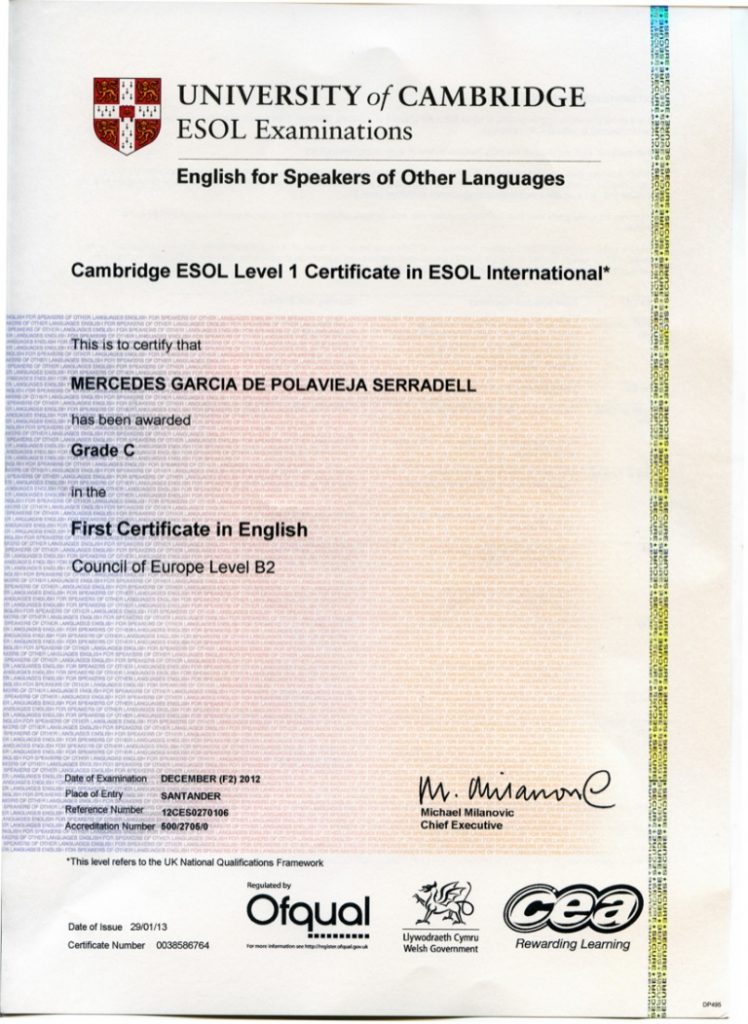What Does Cambridge English: First For Schools Involve?
Cambridge English: First for Schools is for learners who have an upper-intermediate level of English, at Level B2 of the Common European Framework of Reference for Languages (CEFR). It is taken internationally and thousands of colleges and universities around the world, as well as employers, recognise it as proof that you can use spoken and written English for study, work and life.
Cambridge English Language Assessment carries out extensive research to make sure that you get the fairest, most accurate result, and that the exam is relevant to the different ways that you may need to use English. The test includes exact the same tasks and question types as Cambridge English: First. The only difference is that Cambridge English: First for Schools uses topics that are of interest to candidates who are at school.
You can take Cambridge English: First for Schools as a paper-based or computer-based test.
About The Exam
Here’s summary of what’s in the exam :
| Paper Details | What's in the paper | Skills Assessed |
|---|---|---|
| Reading and Use of English : 1 hour 15 minutes |
There are seven parts in the Reading and Use of English paper. First, there are three short texts with different tasks. You have to complete the gaps with different kinds of words. The fourth part doesn’t use a text. You have to rewrite sentences in a different way. Parts 5–7 all have texts and comprehension tasks. First there’s one long text with eight multiple choice questions, then a gapped text which you must complete by choosing the correct sentence, and a multiple-matching task. There’s a wide range of different texts, and all of them are about topics which are interesting to school-aged students. |
The Reading and Use of English paper tests your reading skills and your knowledge and use of vocabulary and grammar. You will be assessed on: • how well you can use a range of vocabulary and grammar • a range of reading skills, including reading for detail, understanding opinions and feelings, understanding how a text is organised and understanding the main idea. You also need to be able to read a text quickly to get the general idea. |
| Writing 1 hour 20 minutes |
The Writing paper has two parts. The first is compulsory, and you must write an essay which shows your opinion about the topic, using ideas you’re given and one idea of your own. Then you have a choice between four questions, and you must choose one. One of the questions is always about a set text, which you can read (or watch the film version) and prepare before the exam. Find out what the set text is here. | In both questions, you’ll be
assessed using the assessment
criteria: Content, Communicative Achievement, Organisation and Language. |
| Listening
Approximately
40 minutes |
There are four parts in the Listening paper, and there is a mixture of monologues (one speaker) and dialogues (two or more speakers). The tasks include answering multiple-choice questions about short and longer texts ; completing notes while you listen to a longer text; and matching options to short monologues. | This paper tests different real-life listening skills, such as listening for information, opinion or detail, or listening for the general meaning of the whole text. |
| Speaking
14 minutes
Paired : two (occasionally three) candidates together |
The Speaking test starts with general conversation between the examiner and each candidate. Then you take turns to speak for 1 minute about two photographs. In Part 3, you discuss a decision making task with the other candidate. Finally, you will discuss topics related to the task in Part 3. | You are tested on different aspects of speaking, such as pronunciation, how well you use grammar and vocabulary, how you organise your ideas and how well you participate in discussions with other people. |
Your overall performance is calculated by averaging the scores you achieve in Reading, Writing, Listening, Speaking and Use of English.
Sample Certificate


